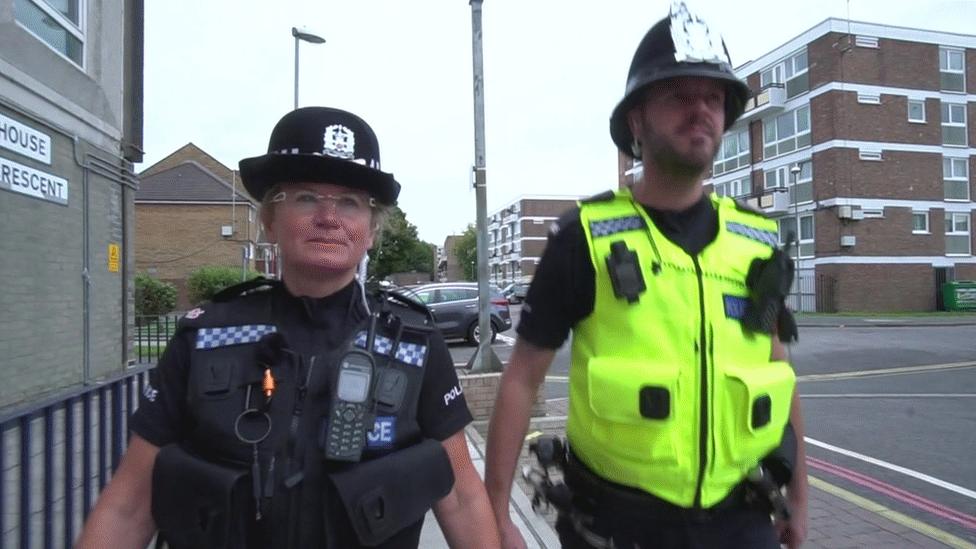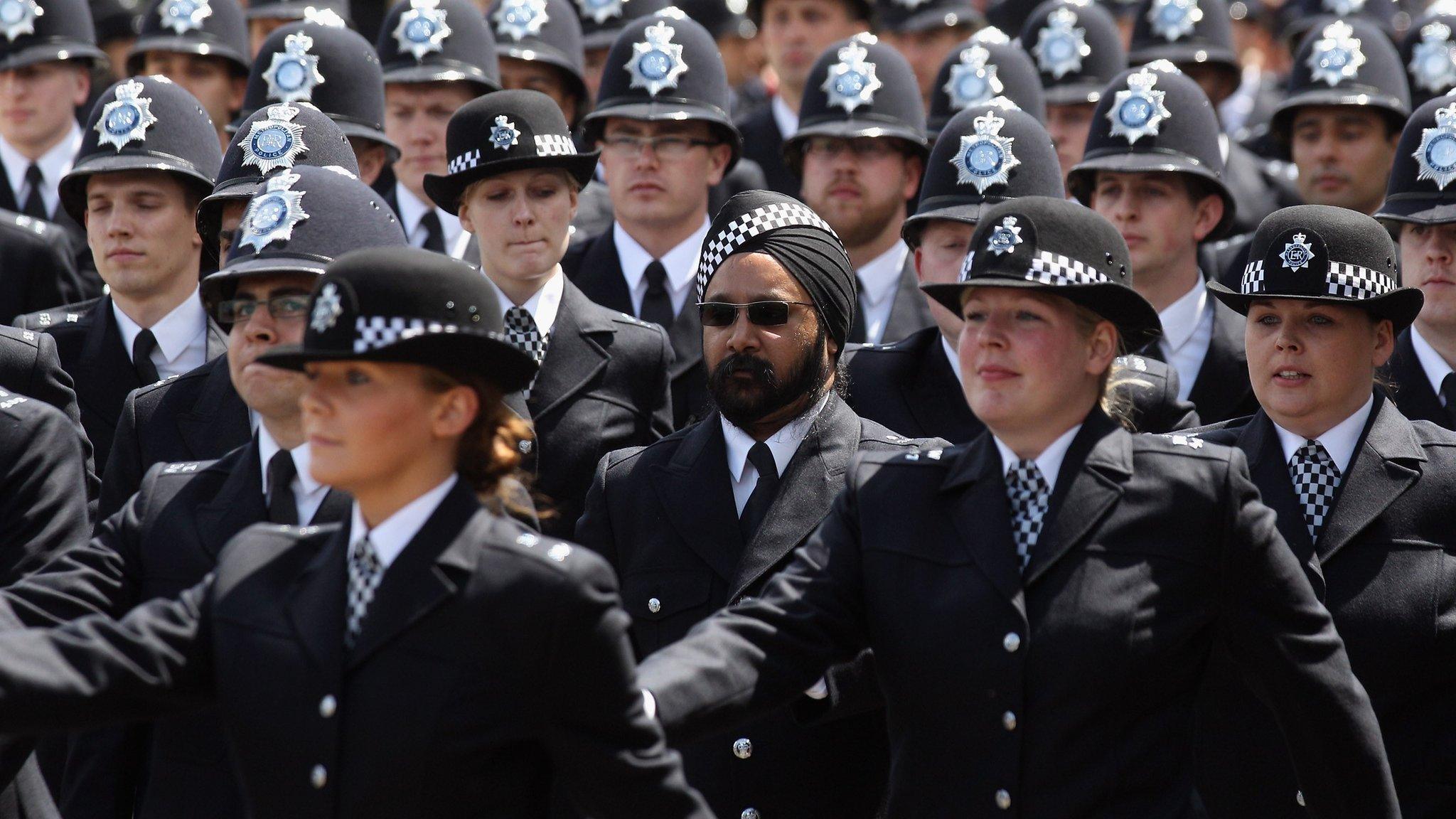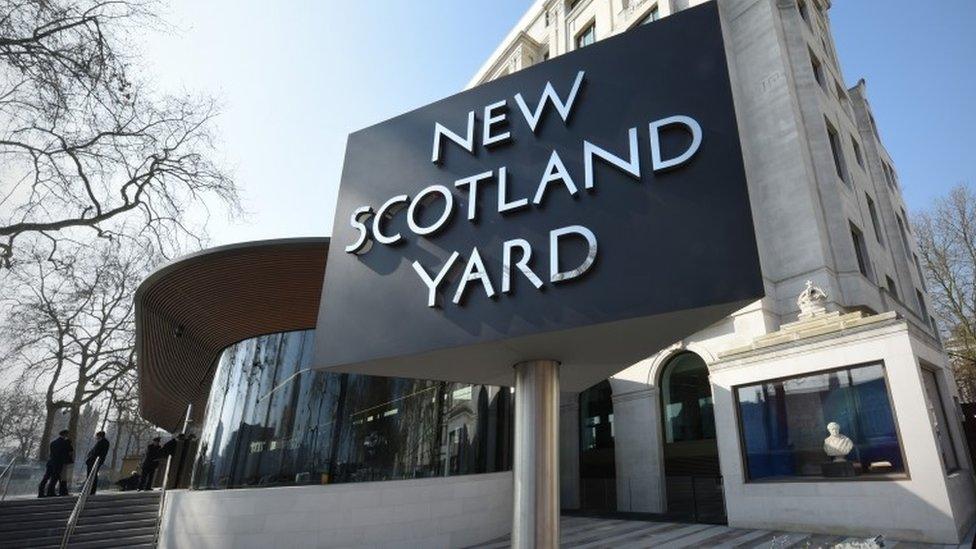Boss without the beat: Direct entry recruit set to take command
- Published
Police force to appoint commander in direct entry scheme
"Oh mum you look like a cop!" said Maggie Blyth's daughter, seeing her in uniform for the first time.
But unlike many new cops, Maggie is not about to begin years of grinding out beat shifts as a constable.
She is getting ready to command more than a hundred police officers and staff.
The BBC's Daily Politics was given exclusive access to a new recruit becoming part of one of the most controversial reforms in the history of policing.
After just over a year's training, Maggie Blyth is to become Portsmouth District Commander, Hampshire's first Direct Entry superintendent. , external
She previously had a 30-year career in child protection.
"One colleague described it as a bit of a handbrake turn," Maggie tells me.
"She said, you've got retirement coming up, couldn't you just settle into those plans? But I was looking for another challenge, I think I had something to offer."
'Much to be gained'
The government's Direct Entry scheme allows talented civilians to join the police in senior roles.
It breaks a 180-year tradition of officers with "mud on their boots" gradually rising through police ranks.
Maggie addresses this head on: "Before I joined, many of the questions I asked of colleagues in policing and elsewhere, were around credibility."
"I won't have some of the specialist skills of someone who has walked the beat. What I do bring is a range of other skills and experiences that I think compliment where UK policing is going."
During her career Maggie Blyth dealt with some of the most challenging child protection issues facing authorities.
In Oxford, she chaired the safeguarding children board which made headlines after revealing that 300 children were believed to have been sexually exploited in the city over a number of years, by gangs of mostly Asian men.
Similar cases in Rotherham, Newcastle, and Rochdale showed vulnerable youngsters had been failed by the authorities.

Maggie Blyth became a superintendent after 30 years in child protection
"Policing is really changing," Maggie says. "I think there has to be a much better join up between the different NHS health organisations, between local government and policing to find a joint solution to some of these continuing issues facing our communities."
The College of Policing received more than 2,000 applications for this year's Direct Entry scheme.
Recruits have come from banking, Army, and Home Office backgrounds - to name a few.
But not all police forces are receptive. Only nine forces are looking to take on new Direct Entry recruits in 2017.
Home Secretary Amber Rudd believes there is "much to be gained" from bringing outside talent into policing.
She pointed out in a speech to the National Police Chief's Council last year that there were six people who passed the Direct Entry superintendent assessment who were not offered posts, saying: "That is policing's loss."
'Split second' decisions
Perhaps unsurprisingly from within an institution with a culture of discipline and earning one's rank, there have been concerns.
John Apter from the Hampshire Police Federation told the BBC Daily Politics Programme: "Whilst the Direct Entry recruits are highly motivated and very gifted individuals, they don't really have the concept of policing to fall back on.
"You get the knowledge, and the understanding of policing by walking in the same shoes as those police officers have done"
He believes it could even prove dangerous.
While superintendents take on a strategic, managerial role, John Apter says inspector level recruits could be left particularly exposed, because they must make critical operational decisions under pressure.
"At 3am on a Saturday morning, whether that's a firearms incident, whether it's a hostage type situation, or a large scale public order incident, you don't have a bank of experts on hand to give you advice."
"You have to make those decisions in a split second. You have to rely on your experience. I have serious concerns that that will be a problem."
"Direct Entry needs to be evaluated. It's costing a fortune. Is it good value for money? I'm not convinced it is."
Portsmouth presents a wide range of policing challenges.
From alcohol-fuelled violence, to previous problems with radicalisation and some racial tensions, the city is a busy patch.
Maggie Blyth has been completing a series of placements with front-line officers, acting as a sergeant and inspector, making arrests and attending a variety of operations such as drugs raids.
While filming we accompany her to a tower block to follow up on a neighbourhood dispute.
She has been under continuous assessment and will have to sit final exams before becoming Portsmouth's district commander for real.
Respect
I ask her whether she really thinks she has been able to cram in all the knowledge and experience she'll need, in just a year?
"One of the things said to me," Maggie explains, "is that you're already 80% a superintendent in terms of the leadership skills you've brought from elsewhere, 20% is in-depth operational policing knowledge and understanding."
"This last year has equipped me with detailed knowledge of what it's like to be policing in Portsmouth and across Hampshire from a range of specialist aspects of policing. I think in terms of the advice and support I will also have from colleagues, that equips me well."
So what about officers under her? Will she have their respect? Some may have been waiting years themselves for promotion.
"You'd have to ask them," Maggie says. "I've had a very strong welcome. Peers have said to me phone any time, even if it's 4am in the morning.
"I'm sure, quite rightly, there will be questions asked about new ways of entry into policing and how effective that is.
"My own personal view is that having different routes into policing is positive. We should be diverse"
Changing long-held traditions in policing was always going to be tough. Many have doubts about Direct Entry, and Maggie Blyth knows an excellent track record from her previous career can only get her so far. She will need to prove her worth.
But an officer who accompanies us, confides in me off camera, saying: "Everyone wants her to succeed. Whatever people say about it beforehand, once someone is in there with you, you want them to succeed. That is policing. We're a team."
- Published15 December 2016

- Published31 May 2017
